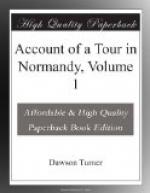The variety of soil in the vicinity of the city renders it eminently favorable to the study of botany. It is peculiarly rich in the Orchideoe of the most beautiful and interesting families of the vegetable kingdom. The curious Satyrium hircinun is found in the utmost profusion upon the chalky hills immediately adjoining the city; and, at but a few miles distance, in a continuation of the same ridge, the bare chalk, under the romantic hill of St. Adrien, is purpled with the flowers of the Viola Rothomagensis, a plant scarcely known to exist in any other place.
The suburbs of Rouen abound with nursery-grounds and gardens: the former contribute greatly to the preservation of the genuine stock of apple-trees, which furnish the cider, for which Normandy has for many centuries been celebrated; the latter supply the inhabitants with the flowers which are seen at almost every window. The square in front of the cathedral is the principal flower-market; and the bloom and luxuriance and variety of the plants exposed for sale, render it a most pleasing promenade. Various species of jessamines and roses, with oleanders, pomegranates, myrtles, egg-plants, orange and lemon trees, the Lilium superbum and tigrinum, Canna Indica, Gladiolus cardinalis, Clerodendrum fragrans, Datura ceratocolla, Clethra alnifolia, and Dianthus Carthusianorum, are to be seen in the greatest profusion and beauty. They at once attest the care of the cultivators, and a climate more genial than ours. None of the flowers, however, excited my envy so much as the Rosa moschata, which grows here in the open air, and diffuses its delicious fragrance from almost every window of the town.
It is perhaps to the credit of Rouen, that science and learning appear to flourish more kindly than the drama. The theatre of Rouen is quite uncharacteristic of the passion which the French usually entertain for spectacles. The house is shabby; the audience, as often as we have been there, has been small; and in this great city, the capital of an extensive, populous, and wealthy district we have witnessed acting so wretched, as would disgrace the floor of a village barn. We have been much surprised by seeing the performers repeatedly laugh in the face of the spectators, a thing which I should least of all have expected in France, where usually, in similar cases, the whole nation is tremblingly alive to the slightest violations of decorum. And yet Corneille, the father of the French drama, was born in this city: the scene that is used for a curtain at the theatre bears his portrait, with the inscription, “P. Corneille, natif de Rouen;” and his apotheosis is painted upon the cieling. These recollections ought to tend to the improvement of the drama. The portrait of the great tragedian is more appropriate than the busts of Henry IVth and Louis XVIIIth, which occupy opposite sides of the stage; the latter laurelled and flanked with small white flags, whose staffs terminate in paper lilies.




